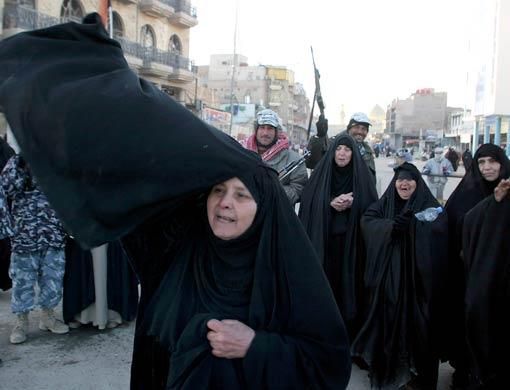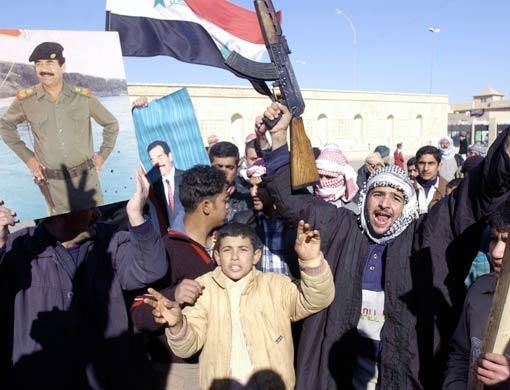Beirut/Cairo: His enemies rejoiced, his defenders proclaimed him a martyr, and others looked ahead to the impact the execution of deposed Iraqi leader Saddam Hussain would have on Iraq.
Click here to see the 'Life and times of Saddam Hussain' (pdf)
Kuwaitis and Iranians welcomed the death of the leader who led wars against each of their countries.
Former information minister of Kuwait, Sa'ad Bin Teflah Al Ajmi, said, "This is the best Eid gift for humanity," referring to Eid Al Adha, the most important holiday on the Islamic calendar, which began yesterday for Sunnis.
"This is the fair punishment for the one who executed our sons without trials," said Al Ajmi, who heads a state committee that has been searching for 605 people who went missing in Saddam's seven month occupation of Kuwait that began in 1990. He said the families of the missing were 'ecstatic.'
Iranian state TV hailed the hanging of Saddam who waged war with Iran from 1980-88. "With the execution of Saddam, the life dossier of one of the world's most criminal dictators was closed," state-run television reported yesterday.
Meanwhile, Saddam's execution angered many Arabs and Muslims. Even some who felt the former Iraqi leader deserved to die questioned the justice of his trial. Many said his death would worsen violence in Iraq.
"The timing of this execution [during the Muslim feast of Eid Al Adha] is an affront to all Arabs and Muslims," Abdul Bari Atwan, editor of the London-based Al Quds Al Arabi newspaper, told Al Jazeera television. "It is an act of scorn against a great religion by the United States and the Iraqi government.
Civil war
"Arab public opinion wonders who deserves to be tried and executed: Saddam Hussain who preserved the unity of Iraq, its Arab and Islamic identity and the coexistence of its different communities such as Shiites and Sunnis ... or those who engulfed the country into this bloody civil war," he said.
News of Saddam's hanging at dawn for crimes against humanity shocked Palestinians, many of whom had seen the Iraqi strongman as an Arab hero for his missile attacks on Israel during the 1991 Gulf War that ended Iraq's occupation of Kuwait. People in Gaza, alerted by text messages or phone calls, hurried home after Eid prayers in mosques to watch the news and to slaughter their sheep for the Muslim feast.
"What is he [Saddam], a sheep? I think the Americans wanted to tell all Arab leaders who are their servants that they are like Saddam, nothing but sheep slaughtered on the day of Eid," said a worshipper called Abu Mohammad Salama.
Full justice
Mushir Al Masri, a lawmaker of the governing Hamas movement, said: "The execution of President Saddam Hussain was a proof of the criminal and terrorist American policy and its war against all forces of resistance in the world."
But Iran rejoiced at the hanging of the man who led his country into war with the Islamic Republic in the 1980s.
"The people of Iraq are the victor in the issue of Saddam's hanging, just as they were the main victor in his fall," Hamid Reza Asefi, Deputy Foreign Minister in parliamentary affairs, was quoted by the official Iranian news agency IRNA as saying.
Ahmad Al Mudaweb, a political editor at Bahrain's Al Watan newspaper, predicted that Saddam's hanging would spur the insurgency by his fellow Sunnis in Iraq.
"This will result in more division among Iraqis. It will help Saddam's supporters in their campaign of violence," he said. "He will become a kind of martyr, and his status as a political figure will increase."
Khalaf Al Alayan, a Sunni member of Iraq's parliament, told Al Jazeera from Jordan: "This was an act of vengeance against Iraq ... and a great humanitarian crime against the Iraqi people and a prisoner of war held by the United States."
Beyond the Arab world, few Muslims seemed ready to defend Saddam, but many doubted that full justice had been done.
"The punishment should have been given to Saddam, because Saddam killed many Iraqi people and also members of Hizb ut Tahrir there," said Esmail Yusanto, spokesman of the Muslim group Hizb ut Tahrir in Indonesia.
But he said US President George W. Bush and British Prime Minister Tony Blair deserved no better.
In Pakistan, Liaqat Baluch, a leader of a six-party opposition alliance of conservative religious parties, said Saddam was a 'bad guy' but his trial had been unfair.
"This will further increase hatred of America. No one liked or supported Saddam Hussain here, but the way he was tried was improper and unjust." Americans convicted of killing civilians in Iraq and Afghanistan should be treated the same way, he said.
In Kuala Lumpur, Rhiza Gazi, a 31-year old Malaysian lawyer, said Saddam had "got what he deserved after all the suffering people had to go through under his rule".













